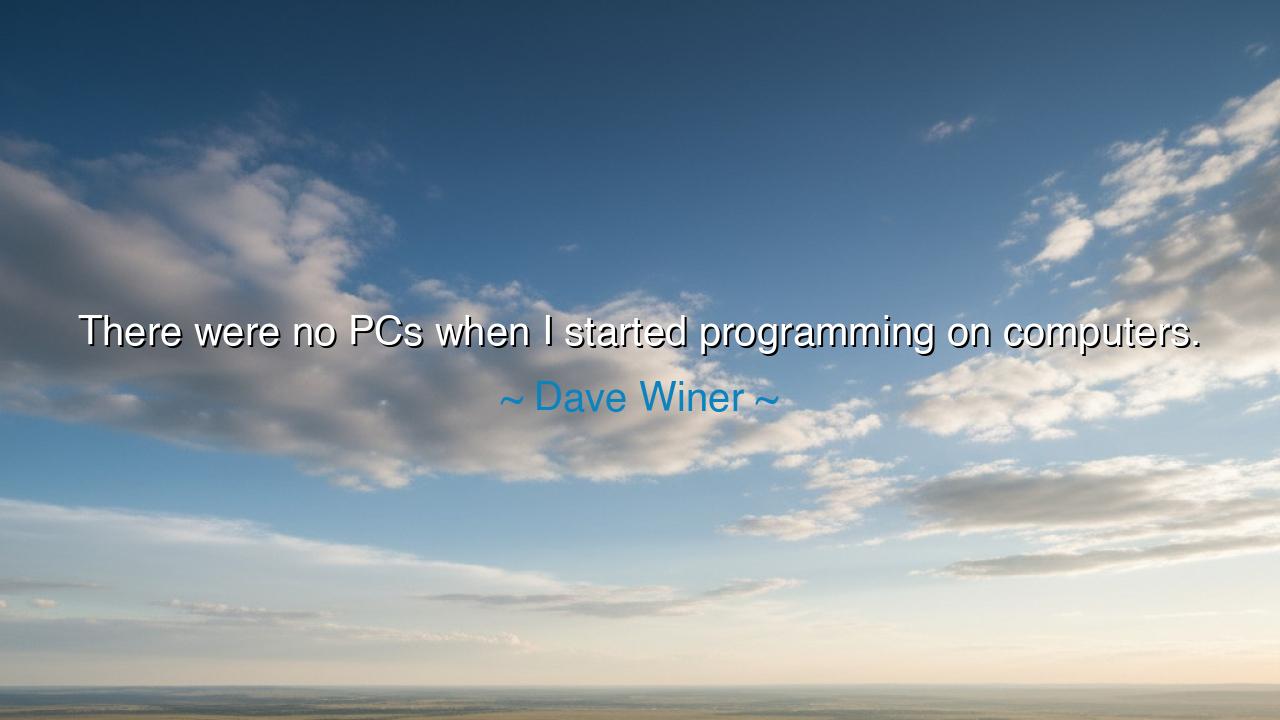
There were no PCs when I started programming on computers.






In the ever-evolving saga of human progress, there are moments when the course of history changes in ways that are not immediately apparent. It is only with the passage of time that we can look back and see the true weight of these shifts. Dave Winer, a pioneer in the realm of programming and technology, once stated, “There were no PCs when I started programming on computers.” These words, though simple, carry with them a profound insight into the foundations of the digital world that we now take for granted. In them, we find a reflection on the evolution of technology and the individual effort required to shape what was once an unimaginable future.
In the early days of human civilization, knowledge was passed down through oral tradition, etched in stone, or written on scrolls and tablets. Think of the ancient Egyptians, who inscribed the wisdom of their world on the walls of their temples and tombs. But as time went on, new tools and methods were discovered, and writing became printed in books that spread knowledge far and wide. It is in this constant search for innovation and efficiency that humanity has always found its greatest strides. Just as the advent of the printing press revolutionized how we spread ideas, so too did the invention of the personal computer revolutionize how we interact with information and each other.
Yet, before the advent of the PC, the world of computing was much more mysterious and inaccessible. The early pioneers of programming, like Winer, began their work on machines that were not the sleek, portable devices we now carry in our pockets. These machines were vast, intimidating, and complex, requiring a profound understanding of both the physical hardware and the software that powered them. There were no user-friendly interfaces, no operating systems that allowed even the most unskilled to navigate; the programmer was a true creator, crafting from raw materials a system of unimaginable potential.
One need only look at the story of Charles Babbage, the so-called father of the computer, to understand the vast difference between the early days of computing and the world we inhabit today. Babbage, in the 1830s, conceived of the analytical engine, a mechanical device designed to perform calculations. Though it was never fully constructed in his time, Babbage’s vision was revolutionary. He envisioned a machine that could be programmed to perform any mathematical calculation—a concept far ahead of its time. Yet, his work remained in the realm of the conceptual for decades, with no means to bring it to fruition. The PC, which Winer refers to, represents the moment when the tools once imagined only in the minds of visionaries like Babbage were finally realized, scaled, and made accessible to all.
Winer’s reflection speaks to the birth of the digital age—the moment when the personal computer democratized technology, giving ordinary individuals the ability to create, innovate, and connect in ways previously unimaginable. It was a turning point in the history of technology. With the advent of the PC, the world was no longer limited to those who had access to vast mainframes or centralized computing power. The power of the computer was no longer confined to institutions, corporations, or governments, but became available to anyone with the will and the knowledge to learn how to use it. Programming, once a specialized and arcane craft, was suddenly available to anyone, offering a new way to shape the world.
The lesson we can take from Winer’s words is one of vision, perseverance, and adaptability. Just as the ancient philosophers and scientists had to innovate with the limited tools of their time, so too did the early programmers who had no personal computers to work with. Their determination and ingenuity paved the way for the world we live in today. Winer, by reflecting on the absence of the PC, invites us to see the value of hard work and persistence in the face of limitations. The true spirit of innovation is not about the tools we are given, but about the way we use those tools to push forward and create new possibilities.
For those of us today, living in an age where the PC has become ubiquitous, the challenge is to remember the history of these technologies. It is not enough to simply use the tools we have; we must also honor the effort, the vision, and the struggles that went into creating them. As we look forward, let us be inspired by those early pioneers who, working with limited resources, were able to shape the digital age. Let us, too, look at the challenges we face and ask: how can we, in our own time, create something new, something that will shape the future for generations to come?
Thus, the practical action is clear: embrace the power of the tools available to us today, but also remember that it was the dedication of those before us—those who worked without the convenience of modern technology—that made our current world possible. Like Winer, we must honor the effort, work hard, and innovate within the limits of our time. Technology will continue to evolve, but its power lies not just in its existence, but in the hands and minds that shape it.






AAdministratorAdministrator
Welcome, honored guests. Please leave a comment, we will respond soon